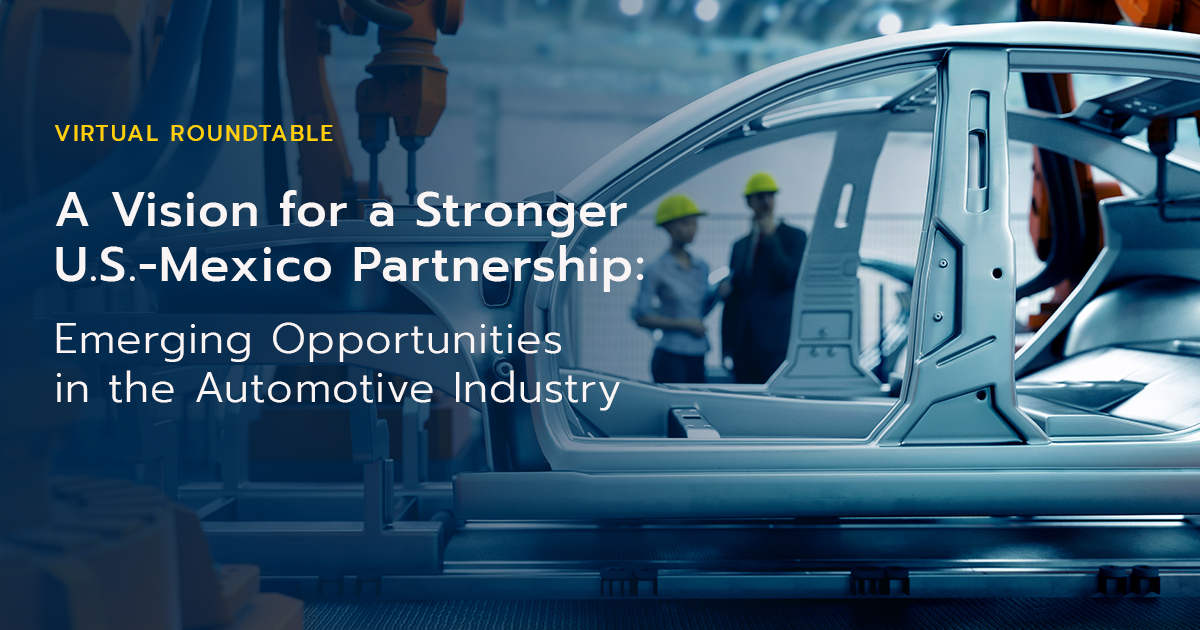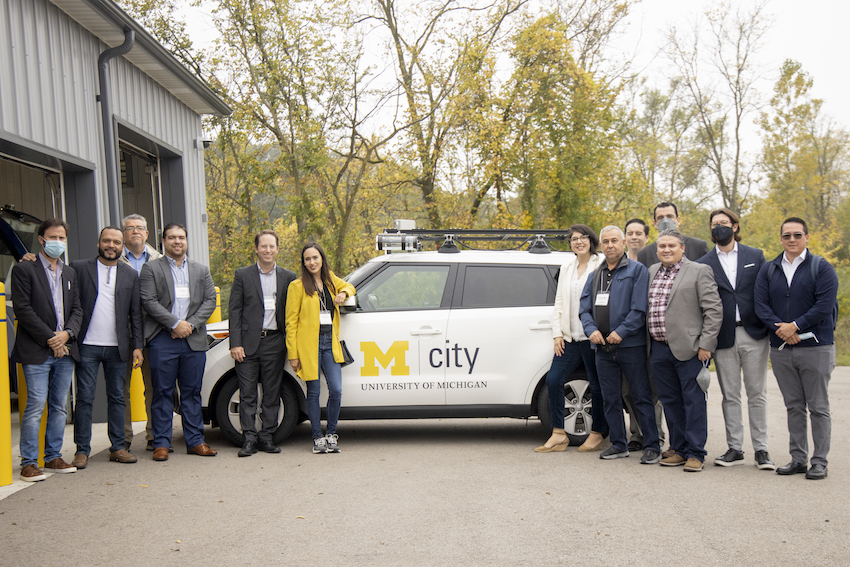WDI worked with the Secretaría de Innovación y Desarrollo Económico (SIDE) and Instituto de Innovación y Competitividad (I2C) of the State of Chihuahua in Mexico to prepare for the transition to electric mobility (e-mobility) in the automotive industry. Through this project, WDI helped Chihuahua develop a statewide strategy to increase its competitiveness and tap into current and future business opportunities in this changing sector. This work included conducting a global e-mobility ecosystem mapping, assessing Chihuahua’s strengths and identifying gaps and opportunities, and developing a roadmap to e-mobility with actionable recommendations for the state’s e-mobility strategy. Two key project outputs include the report “Mapping the E-Mobility Transition: Opportunities and Enablers” and the Roadmap to E-mobility for the State of Chihuahua.
WDI provided due diligence advisory services to the North American Development Bank (NADB) for the potential financing of the construction and operation of a private hospital in San Luis Río Colorado, Sonora, Mexico. This work is helping the NADB assess its first ever financing of a healthcare project. WDI delivered a report to the NADB with findings to assist them in making an informed decision on the opportunities and risks of providing finance. The report summarized WDI’s analysis of various aspects of the business, including operations, management, cost structure, financial projections, risk management, and positioning within the market.
WDI’s Healthcare Delivery sector is offering an online program to equip management executives of private hospitals, clinics, and healthcare delivery enterprises in low- and middle-income countries with the skills to improve efficiency through better processes, and to allocate costs more accurately for better strategic and pricing decisions. The program includes modules on Process Analysis and Optimization, Time-Driven Activity-Based Costing, and Healthcare Supply Chain. Modules on Cost Management and Control, and Due Diligence are in development. The program consists of online, asynchronous training for each of the two modules; synchronous remote class sessions via Zoom; and a team-based action learning project based on a real business challenge at the participating institutions. To date, six hospitals from Mexico, Ghana, Nigeria, Kenya, and Pakistan have participated in the courses. They are: Nyaho Medical Center, Ghana; Grupo OSME, Mexico; Evercare Hospital Lekki, Nigeria; AfyA Care, Nigeria; Avenue Healthcare, Kenya; and Evercare Hospital Lahore, Pakistan.

On Nov. 5, 2021, the William Davidson Institute at the University of Michigan and the Ross School of Business at the University of Michigan, in collaboration with the US-Mexico Foundation (USMF), will host a virtual roundtable to discuss further integration within the auto industry in the U.S. and Mexico. The event will bring together accomplished diplomats, industry leaders and academia to share their perspectives on trends and opportunities for players in both countries.
For decades, the U.S.-Mexico automotive supply chain has been deeply unified, collectively manufacturing around 20 percent of the world’s passenger cars and commercial vehicles. At the same time, the automotive sector is undergoing a profound transformation, fueled by technological innovations, sustainability efforts and supply chain concerns.
During the virtual roundtable, two interrelated, consecutive panel discussions will focus on these shifts and how both sides of the border can leverage them in the context of an enhanced U.S.–Mexico partnership.
“At this time of great change in the automotive sector, further integration between businesses in the U.S. and Mexico can increase competitiveness for both economies,” said Paul Clyde, president, William Davidson Institute, and professor of business administration, University of Michigan’s Ross School of Business. “As part of WDI’s mission to help formulate the tools for commercial success in low- and middle-income countries, we’re delighted to work with the Ross School of Business and USMF to facilitate this important dialogue.”
The panelists taking part in the event include:
Francine Lafontaine, interim dean, Michigan Ross School of Business, and Diana E. Páez, senior director, grants & partnerships, grants management, WDI, will serve as moderators.
The “A Vision for a Stronger U.S.-Mexico Partnership: Emerging Opportunities in the Automotive Industry” virtual roundtable is free and open to the public. Register for the Nov. 5 event here or by visiting the WDI homepage at wdi.umich.edu.
Established at the University of Michigan in 1992, the William Davidson Institute (WDI) is an independent, non-profit research and educational organization. WDI is guided by our founding principle that thriving businesses drive economic development and improve social welfare in low- and middle-income countries. Our work focuses on developing, adapting and applying sound business principles in four interrelated sectors necessary for a thriving economy: professional education and training, energy, finance and healthcare, in addition to offering performance measurement and improvement services that span these sectors. With a unique blend of field-based experience and academic rigor, WDI works to build stronger economies and healthier societies.
Media Contact:
Scott Anderson
+1 734-615-4560

Note: This was the first in-person event WDI has held since the Covid-19 pandemic. WDI followed all protocols, including masking indoors and vaccine requirements.
The transformation of the global automotive industry in everything from electric vehicles to the supply chains to workforces that will build them, requires new ways of thinking, new connections and new conversations.
With this massive shift in mind, WDI, in collaboration with Economic Development of Juárez and the US-Mexico Foundation (USMF), convened a week-long visit for 15 senior leaders in business, technology, academia and government from the State of Chihuahua, Mexico – a critical hub in the North American automotive industry.
The delegation met with faculty and other experts representing the University of Michigan’s Ross School of Business, Transportation Research Institute, College of Engineering, Technology Transfer and Mcity – U-M’s public-private mobility research partnership. The group also traveled to Detroit, meeting with representatives from TechTown, NextEnergy, the Office of Future Mobility and Electrification, Detroit Economic Growth Corporation, and Automation Alley.
Juárez, Chihuahua’s largest city located on the border with El Paso, Texas, is home to more than 330,000 manufacturing workers, with about half employed by over 100 auto-related companies operating there. Regional economic development leaders say they’re working to advance multiple initiatives focused on mobility, innovation, digitalization, smart city technologies, and workforce development and upskilling.
Fernando Alba, Executive Director of Economic Development for the city of Juárez who led the delegation, noted the industry shift away from the internal combustion engine toward electrically powered vehicles that require fewer parts, will mean cleaner transportation, but also far fewer components produced there.
“The challenge we have is how do we adapt our people, our talent and our companies,” Alba said. “As a city with a heavy manufacturing tradition that is moving away from what we used to do, we need to learn the new tools and techniques to continue to be a leader in the new world of mobility”.
Alba noted that Juárez and the Detroit area share several similarities; both border other countries, the U.S. and Canada, respectively. Their local economies rely largely on the automotive industry, and they both have faced serious social and economic challenges that have hindered economic growth. Ciudad Juarez is now at the beginning of a similar transformation to the one Detroit went through just a few years ago as leaders launched a new vision for development, innovation and inclusion. While challenges remain, the city offers a cautionary tale and many lessons learned that Ciudad Juarez leaders are taking home with them.
“The William Davidson Institute is a key player for us in what we want to do in the future for our region. Being based here at the University of Michigan and close to Detroit, there is no better place to be,” he added.
Alba was accompanied by leaders from Economic Development of Ciudad Juárez, and of the city and State of Chihuahua and the Southwest Manufacturers Industry Association. The delegation also included representatives from companies including Dell, and Microsoft; as well as from the Artificial Intelligence Center, National Polytechnic Institute, Technology Hub, Technology Development Institute, and the Technical Institute of Juárez.
The group participated in a weeklong learning and exchange program that included stops and meetings in Ann Arbor at the American Center for Mobility, Washtenaw Community College, the Center for Automotive Research, the University Research Corridor, the Michigan Economic Center, and SPARK; as well as connecting with mobility players at the Ann Arbor Mobility Summit.
Diana Páez, senior director for Grants and Partnerships at WDI, said hosting the delegation was an excellent example of how the Institute convenes a wide spectrum of players around the shared opportunities in low- and middle-income countries.
“How we all think about mobility is changing faster than any one company can possibly manage. Keeping pace with that change will require novel approaches and new conversations, not just in Southeast Michigan or Chihuahua, Mexico, but around the world,” Páez said. “The change is happening now, and the consequences have implications for multiple economies.”
Additionally, when it comes to the mobility industry, what happens in Detroit reverberates not only in Mexico but around the world – from supply chain issues to the shift toward electrification. Indeed, every move by the U.S.-based automakers has ripple effects in other markets, and the challenges – and opportunities for businesses – are worth exploring, Páez said.
Building on this effort, on Nov. 5, WDI and Michigan Ross, in collaboration with USMF, will host a virtual roundtable to discuss further integration within the auto industry in the U.S. and Mexico. The event, A Vision for a Stronger U.S.-Mexico Partnership: Emerging Opportunities in the Automotive Industry, will bring together accomplished diplomats, executives, analysts and academic leaders to share their perspectives on trends and opportunities for players in both countries.
“At WDI, bringing together the players who truly drive economic growth and opportunity is what we do,” Páez said. “The future of mobility is global, and that’s where we are well-positioned to have the most impact. For us, it’s where the rubber hits the road.”

Participants in the Communication workshop post their selfies to the ExtendEd portal.
How does an educator convene a global classroom across a dozen countries, numerous cultures and differing perspectives? Sometimes, it’s better to instead let the students set the pace.
WDI’s Education Sector team recently tailored two fully online courses for The Ford Motor Company Fund as part of the Ford Community Impact Fellows Training program. Students accepted into the program work together to advance understanding and new thinking around topics such as innovation and entrepreneurship.
The courses were tailored to the students’ needs by key personnel at WDI’s Global Virtual Learning Center (GVLC), which was established to advance the field to create international linkages and promote economic growth in emerging markets. Students hailed from a dozen countries including Brazil, Ghana, Kenya, Mexico, Morocco and Sierra Leone.
“In this day and age, we all need to be continuous learners,” said Amy Gillett, vice president of the Education sector. “In a time when it’s difficult or impossible to bring people together face to face, this format is really effective and it also sets students up for making long-term connections with one another.”
The two fully online courses include one module on developing leadership qualities and a second on improving interpersonal communication skills. About 130 students participated in the leadership module, offered for seven weeks ending April 11, and 179 students are taking part in the five-week communications module, set to end July 12. The leadership course helped participants understand themselves as leaders on both personal and team levels, and drew on the Michigan Model of Leadership. The communications course emphasized cross-cultural communication, managing emotions and interpreting body language across different nationalities and traditions.
WDI produced the content for the courses, which were hosted on the ExtendEd portal – the Institute’s proprietary learning management system. Students viewed a series of instructional videos on ExtendEd, followed by quizzes to check for comprehension. Students were assigned to teams across countries to work on a project together and practice their new leadership skills.
While the students were from many different countries, pursuing a wide variety of degrees and occupations – from business to medicine – a well-designed online learning environment was a perfect vehicle for bringing them together.
“It’s an efficient way to reach people with targeted training, and it’s the way people prefer to learn,” said Gillett. “They want to learn when they have time to learn, even if it’s in 15-minute increments. Students log in at their own pace, learn at their own pace, and take the modules on any device.”
The course is a perfect example of a small private online community – or SPOC – which is designed to nurture an intimate learning environment where students can interact and get to know one another other.
At the conclusion of the modules, WDI hosts a live webinar to summarize the learning. This is followed by sending participants a series of reminders on what they learned in the course. Such reminders — “Memory Pings” — also prompt them to apply what they learn in the course back on the job.
“It’s vitally important to provide opportunities for tomorrow’s leaders to share new ideas and brainstorm sustainable solutions to make people’s lives better,” said Farah Harb, Global Education Programs Analyst, Ford Motor Company Fund. “Learning and leadership are essential as we navigate and adapt to our constantly changing world.”
Many students found the WDI courses very valuable.
“Giving back to society and creating positive (impact) has always been my passion. In the world, there are so many challenges facing us,” … to fix these problems, the world needs great leaders with great leadership skills and this course has shown me surely that great leaders can be created or trained,“ wrote one student of the Leadership workshop.
Another student noted: “This workshop has been an eye opener and I am certain I am ready to work in every environment.”
As a final assignment, the students submitted videos exploring cross-cultural learning and how to apply that knowledge to real-world scenarios. The finalists for the contest and their video stories, can be found below:
WDI created an 8-week online course: Starting a Business: Your Entrepreneurial Journey. The pilot program ran in April-May 2023. The course consisted of live training sessions, guest talks, short videos, online quizzes, and a capstone project in which participants worked in teams to conceptualize and pitch a new business via a video. The video was then judged by the program mentors and winning teams received a special certificate. The pilot program had 88 participants from nine countries.